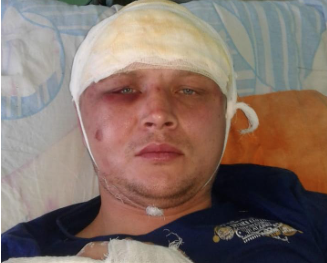 Unidentified assailants viciously attacked a local trade union leader in Kazakhstan on the evening of November 10, 2018, Human Rights Watch said today.
Unidentified assailants viciously attacked a local trade union leader in Kazakhstan on the evening of November 10, 2018, Human Rights Watch said today.
Dmitry Senyavskii, leader of the Karaganda region industrial-tier fuel and energy trade union, was hospitalized. His injuries prevented him from meeting with a visiting international trade union delegation in the capital, Astana, three days later. Kazakh authorities initiated an investigation under the offense of “hooliganism,” but they should also examine the possibility that he was targeted because of his union activism.
“Kazakh authorities should waste no time in finding out who attacked Dmitry Senyavskii and holding them accountable,” said Mihra Rittmann, senior Central Asia researcher at Human Rights Watch. “They should ensure that Senyavskii can carry out his union activities without undue interference or fear of retaliation.”
Senyavskii, 38, was working in his garage in the mining town of Shakhtinsk around 8:30 p.m., when a man knocked on the door asking for directions to Karaganda, a town about 50 kilometers away. Senyavskii began to respond, when the man lunged at him. Senyavskii told Human Rights Watch that he blocked the man but was further attacked from the side, presumably by a second assailant, hitting his head and side. He said the men did not take anything and disappeared after the attack.
Senyavskii was hospitalized with a broken arm, a cut head, a concussion, and a bruised face. The injuries prevented Senyavskii from traveling to Astana for a meeting with trade union representatives, including those from the International Trade Union Confederation and the Arthur Svensson Foundation, which promotes trade union work.
Senyavskii and his family have suffered previous harassment. On October 17, about a month after Senyavskii returned home from an international trade union gathering in Bosnia and Herzegovina, an unidentified assailant broke his apartment window in the middle of the night. A week later, an unidentified person called his wife, accusing Senyavskii of engaging in extramarital relations during his trip. Senyavskii’s family filed a complaint about the broken window, and the authorities told Senyavskii they have opened an investigation.
Senyavskii’s colleagues link the attack to his professional activities. “It is not by chance that he is unable to meet with representatives of international trade unions in Astana on November 13,” colleagues at the now-closed Confederation of Independent Trade Unions of Kazakhstan (KNPRK) told Human Rights Watch in an email. “The pressure [on Senyavskii] began after he returned from Bosnia and Herzegovina, where he represented independent trade unions.”
Following the adoption in 2014 of a new trade union law, the environment for independent trade union activism has become highly restricted in Kazakhstan. The International Labour Organization (ILO) has repeatedly called on the government to amend the law and uphold its international labor rights commitments, including at a high-level ILO tripartite meeting in Kazakhstan in May.
Although two trade union leaders were released from prison on parole earlier this year, the government has not followed through on its May pledge to amend the trade union law. The government continues to deny registration to the Confederation of Independent Trade Unions of Kazakhstan, which unsuccessfully attempted to register three times during 2018 under a new name.
Kazakh authorities in Shymkent opened a spurious criminal case in September against Erlan Baltabay, another independent trade union leader. Baltabay, head of the local trade union Decent Work for petrochemical industry workers, has repeatedly spoken out critically about the situation for trade unions in Kazakhstan, including at the International Labor Conference in Geneva in 2017.
The investigation stems from a complaint filed by a trade union member, who accused Baltabay of stealing approximately US$28,000 in trade union membership dues. Baltabay told Human Rights Watch that the funds, which remain in his possession, were placed under his supervision as chairman of the union, and that he can account for the funds before union members.
The authorities repeatedly summoned Baltabay for questioning, searched his home and office, and seized trade union documents and its stamp, which has effectively paralyzed his union from carrying out any formal activities. The investigation is ongoing.
Kazakhstan’s partners, including the European Union and the United States, should press Kazakh authorities to thoroughly investigate the attack against Senyavskii, cease targeting union leaders with spurious criminal investigations, and create an enabling environment for trade unions.
“The violent attack on Senyavskii and yet another criminal case against a trade union leader are urgent reminders of the highly restrictive space for trade union activism in Kazakhstan,” Rittmann said. “The Kazakh government needs to allow workers to defend their rights without fear of violent repercussions.”
HRW.ORG, November 12, 2018




